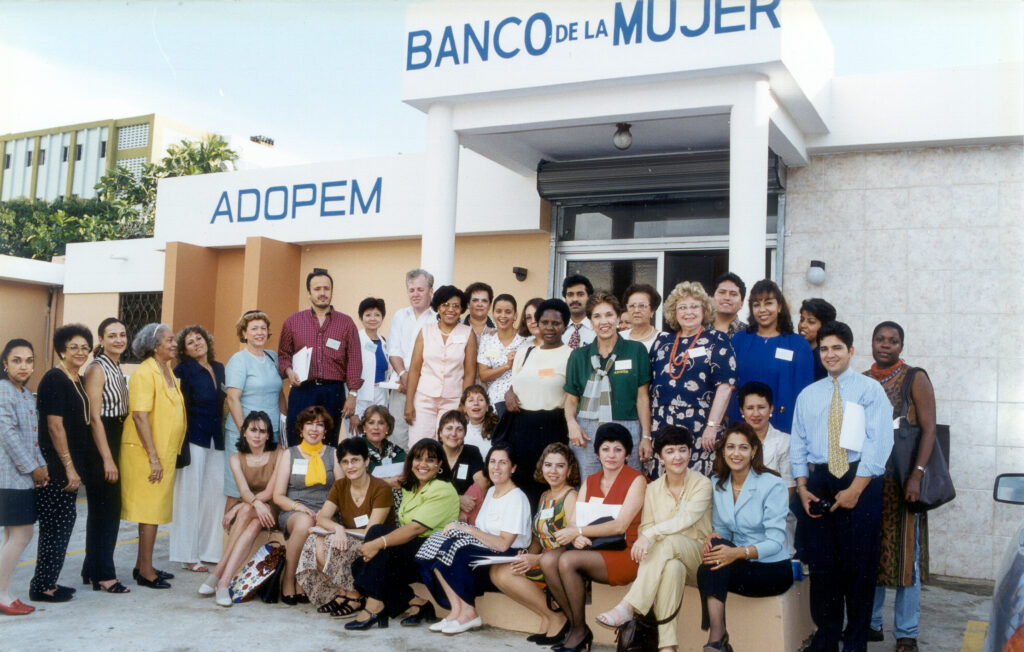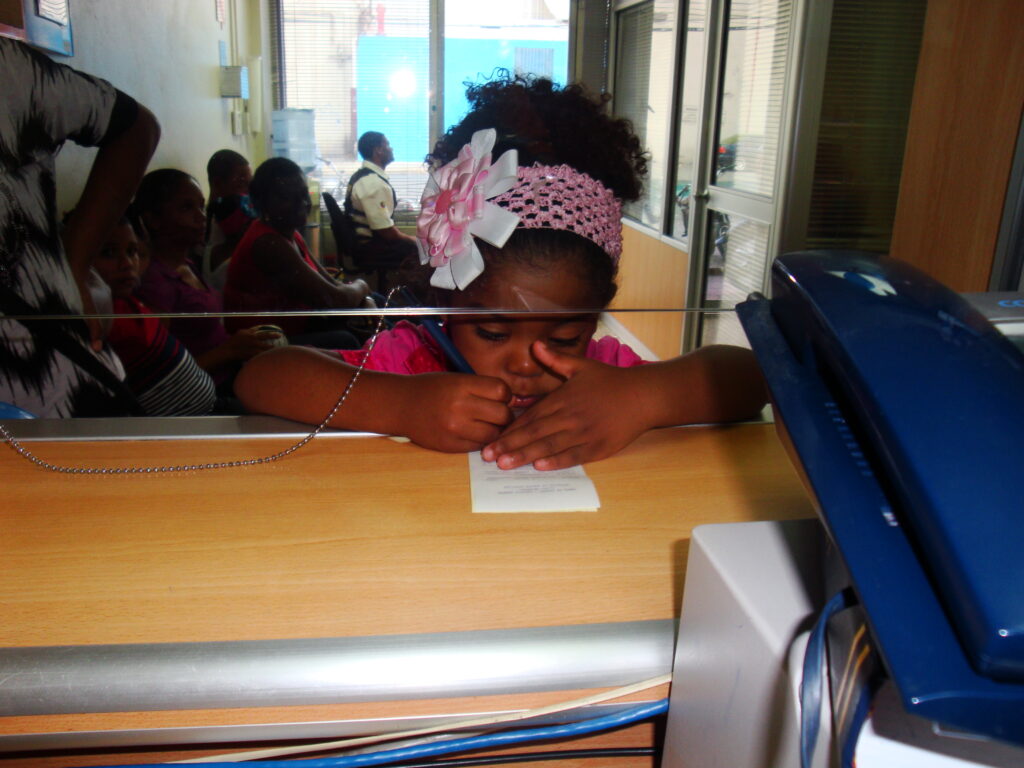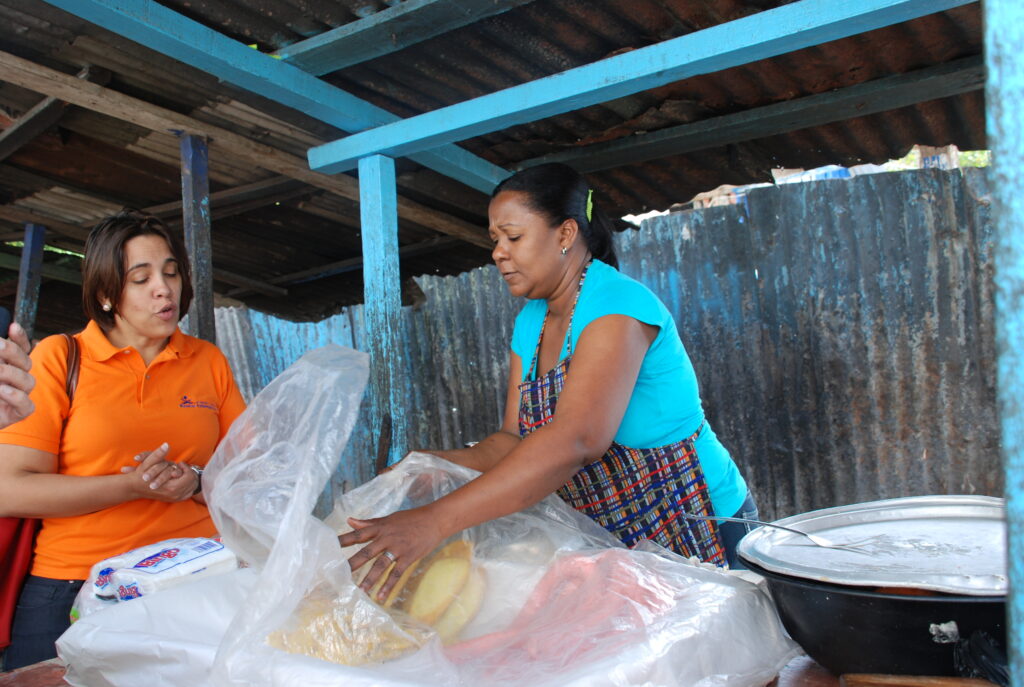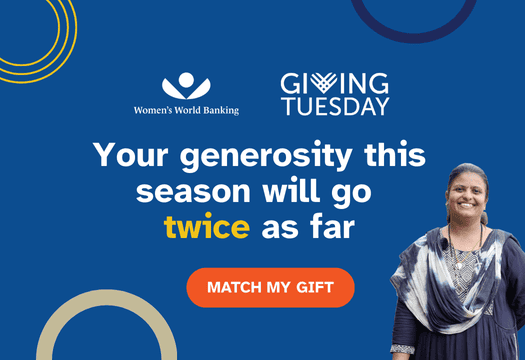To celebrate Women’s World Banking’s 45th anniversary, we are showcasing the voices of individuals from around the world who have shaped and touched Women’s World Banking journey since its inception in 1979 at Commission on the Status of Women to today!
These are stories from across Women’s World Banking’s reach from the women we serve and our customers, to allies and women in leadership who have contributed to women’s economic empowerment and financial inclusion.
In the world of financial inclusion, few stories are as intertwined with legacy and family as that of Dr. Mercedes Canalda, a previous longtime Board Chair of Women’s World Banking, and her daughter, Meky Canalda de Beras Goico. Together, they’ve built Banco ADOPEM, a pioneering financial institution in the Dominican Republic focused on empowering the country’s most vulnerable women and micro-entrepreneurs.
This commitment has spanned decades, from the founding of Asociación Dominicana para el Desarrollo de la Mujer (ADOPEM) in 1982, to its transformation into Banco ADOPEM in 2004. The bond between mother and daughter is the thread that weaves through this transformative journey, with each bringing her distinct vision and leadership to continue Dr. Canalda’s work. Their leadership has transformed the financial landscape for thousands, demonstrating the enduring power of family values in business and social impact.
A Shared Vision: From NGO to Bank

Dr. Mercedes Canalda’s journey into microfinance began with a glaring gap: in the Dominican Republic, women represented 50% of the population but 70% of the country’s poor. They faced systemic barriers to financial services and higher unemployment rates—29% for women versus 11% for men. As a mother and lawyer, Dr. Canalda recognized that economic empowerment was the key to building a more equitable society.
In 1982, alongside a group of professional women, Dr. Canalda founded ADOPEM, an NGO dedicated to providing financial education and small loans to women in poverty. The goal was simple yet transformative: equip women with the tools they needed to build businesses, support their families, and break the cycle of poverty. That same year, they became one of Women’s World Banking’s first four Global Network Members, beside Banco W., Friends of Women’s World Banking, and Kenya Women Microfinance Bank.
When ADOPEM transitioned into Banco ADOPEM in 2004, Dr. Canalda faced the growing pressures of the commercialization of microfinance. By 2010, Women’s World Banking was observing a concerning trend due to this pressure within the microfinance sector. On one hand, it was an exciting period as many microfinance institutions chose to become regulated financial service providers. To do so, they brought in external capital and new shareholders, often required by regulators to raise substantial capital, particularly to accept customer savings deposits—a key strategic motivation for these changes. However, our rigorous evaluation of 39 microfinance institutions, including Banco ADOPEM, undergoing this transformation revealed troubling patterns. At the time of these decisions, women made up an average of 86% of their clients. Within four years, this figure had dropped to just 59% after new shareholders and capital entered the picture. Even more alarming was the impact on leadership: if a woman served as CEO or board chair at the time of transformation, she was often replaced, leading to less diverse and predominantly male governance structures. As a financial inclusion champion and longtime Network Member, Dr. Canalda was an exception to this and stayed the course. Thanks to her leadership, Banco ADOPEM has increased its number of women clients by 62%, with women making up 77% of the bank’s total client base—proving that mission and growth can coexist. This worrisome trend and the example of Banco ADOPEM inspired the founding of Women’s World Banking’s Asset Management and a commitment to investing in institutions that prioritize gender diversity and recognize the value of women in financial services.
The Mía Girls’ Savings Program: Empowering the Next Generation
One of Dr. Canalda’s enduring legacies is the Mía girls’ savings program. Launched in 2008 with Women’s World Banking this was the first youth savings account at a Carribean microfinance institution. The initiative aimed to foster financial literacy and encourage young girls to save for their futures. Starting with 15,000 girls, some as young as seven, the program grew quickly as girls named their accounts Cuenta Mía (My Account). Many expressed a desire to save for education and personal growth.

The Mía program had a profound impact, reaching beyond the girls themselves. After five years, an evaluation revealed that Mía families transferred their banking to Banco ADOPEM and exhibited higher savings and better loan repayment rates compared to the general client base. Remarkably, the customer retention rate among Mía families was 82%, surpassing the bank’s average of 77%. This program embodied Dr. Canalda’s belief in creating generational change through financial empowerment.
A Daughter’s Journey: Learning and Leading
Meky Canalda de Beras Goico grew up immersed in her mother’s vision for social change and women’s empowerment. “Mom has always been about courage, creativity, and resilience,” Meky says. Watching her mother change the landscape of women’s financial inclusion left a lasting impression on Meky. She always knew she wanted to contribute to the cause, but more importantly, to expand it.
Meky joined Banco ADOPEM during a pivotal moment—when the bank was transitioning from a small NGO to a regulated financial entity. Despite her success at the Central Bank, Meky felt called to return to the mission that had shaped her childhood.

The transition to a regulated institution was challenging, requiring careful balancing of growth and social responsibility. Meky leveraged both her formal education and the values instilled by her mother, and various lessons from Women’s World Banking leadership programs to guide the bank through these changes.
The Future of Banco ADOPEM: Financial Inclusion as a Family Mission
Today, under Meky’s leadership as Executive President, Banco ADOPEM is a cornerstone of financial inclusion in the Dominican Republic. With 492,431 clients, 1,405 employees, and 73 branches, the bank continues to provide essential financial services to women entrepreneurs. Its loan portfolio exceeds USD 153 million, with an average loan size of USD 1,064.
The partnership with the BBVA Microfinance Foundation (BBVAMF), established in 2012, has enabled Banco ADOPEM to integrate modern technology and management practices while staying true to its mission. This collaboration has been instrumental in meeting the diverse needs of small and medium-sized enterprises, especially women-led businesses.
One of the most significant measures of success is that 60% of the entrepreneurs served by Banco ADOPEM have escaped poverty within five years, demonstrating the profound impact of the bank’s work.
Meky is keenly aware of the challenges ahead, particularly managing the risks of over-indebtedness and ensuring that the bank reaches clients in the most marginalized communities. Yet, she remains focused on continuing her mother’s legacy. “The future is about efficiency and innovation, but also about listening to our clients and adapting our services to match their evolving needs,” Meky says.
Legacy, Leadership, and Family: The Canalda Story
For both Dr. Canalda and Meky, family is central to their leadership philosophy. Dr. Canalda sees her legacy as one of unity, respect, and commitment to values. “Leadership is about doing things well, with courage and creativity,” she says. “But above all, it’s about staying true to your values—values that endure long after we’re gone.”
Meky reflects on her mother’s relentless drive for innovation: “Mom is always ahead of the curve, always asking, ‘How can we do this better?’” Meky embraces this challenge every day, striving to improve upon the vision her mother created.
Together, Dr. Canalda and Meky have built not just a thriving financial institution but a legacy that will continue to shape the lives of women in the Dominican Republic for generations to come. Their work is a testament to the power of family, the importance of women’s financial inclusion, and the enduring impact of visionary leadership.
Women’s World Banking is dedicated to economic empowerment through financial inclusion for the nearly one billion women in the world with no or limited access to formal financial services. Using our sophisticated market and consumer research, we turn insights into real action to design and advocate for policy engagement, digital financial solutions, workplace leadership programs, and gender lens investing.
As part of our current strategy, we’ve helped provide 82 million women in emerging markets – targeting 100 million by 2027 – access and use of financial products and services that are transforming women’s lives, households, businesses and communities, and driving inclusive growth globally.
Help us reach the nearly billion women still excluded from the formal financial system. Donate now.




